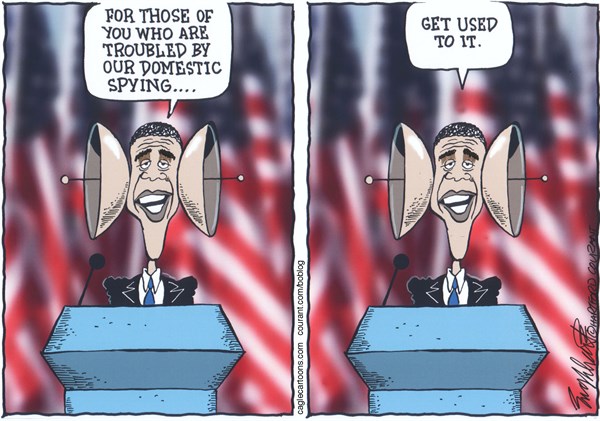The reforms I’m proposing today should give the American people greater confidence that their rights are being protected, even as our intelligence and law enforcement agencies maintain the tools they need to keep us safe.
(The New York Times, January 17, 2014)
This was how President Obama framed competing, if not mutually exclusive, interests in a speech yesterday on anxiously awaited reforms to the NSA spying programs. But the reforms he announced amount to merely throwing privacy pollyannas and clueless Americans a little skin, but leaving the meat the agency feeds on unscathed.
President Obama, declaring that advances in technology had made it harder ‘to both defend our nation and uphold our civil liberties,’ announced carefully calculated changes to surveillance policies on Friday, saying he would restrict the ability of intelligence agencies to gain access to telephone data, and would ultimately move that data out of the hands of the government.
But Mr. Obama left in place significant elements of the broad surveillance net assembled by the National Security Agency, and left the implementation of many of his changes up to Congress and the intelligence agencies themselves.
(New York Times, January 17, 2014)
Never mind the irony in taking the metadata at issue out of the hands of the government and placing them in the hands of cybersecurity firms … like the ones responsible for securing the metadata retailers like Target and Neiman Marcus collect.
The security breach that hit Target Corp. during the holiday season appears to have been part of a broader and highly sophisticated scam that potentially affected a large number of retailers, according to a report published by a global cyber intelligence firm that works with the U.S. Secret Service and the Department of Homeland Security…
That attack affected 40 million credit and debit card accounts and led to the theft of personal information, including email addresses and names, of as many as 70 million [Target] customers.
(The Associated Press, January 17, 2014)
Never mind the irony that private companies like Target, Amazon, Google, and Facebook routinely do far more spying on Americans to sell them stuff than the NSA does to keep them safe. And never mind the folly in predicating the necessary and inherently furtive business of espionage on the shifting winds of public opinion.
Apropos of this, Obama scoffed at the presidents of China and Russia for not being forced into the kind of public debate on their spying programs that Snowden’s leaks forced him into. But, by this logic, he might as well had scoffed at FDR too for not engaging in public debate about decryption techniques (codenamed “Ultra”) that enabled Allied codebreakers to decipher the Enigma-encrypted communications of Nazi forces during WWII.
I have no qualms about Obama not just adopting, but expanding the NSA spying techniques Bush implemented to keep America safe. In fact, my only criticism in this respect has been over Obama’s refusal to acknowledge his indebtedness to Bush…
Ultimately, whatever one thought of the Bush Administration (and as one who opposed his invasion of Iraq, I didn’t think much), there’s no denying that, post 9/11, he performed his most important job as president exceptionally well: he kept America safe.
Which is why the only way for Obama to answer his liberal critics, and at the same time assure the public that what he’s doing is right, is to challenge the American people to ask not what the NSA is doing, but ask what they would be saying the NSA failed to do if there were another 9/11.
For, if Obama canceled these spying programs and terrorists pulled off another coordinated attack, the very people criticizing him today would be the ones criticizing him for failing to tap into and foil their plans.
(“Liberals Feel Betrayed by Obama’s NSA Spying…?” The iPINIONS Journal, June 19, 2013)
Enough said.
Related commentaries:
Betrayed…
Judicial ruling on NSA spying…
